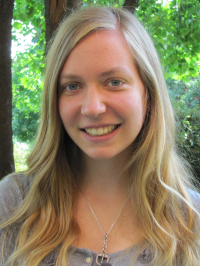2015 SRE Program Participant Profile: MARIEL BEDELL
 |
Hometown: Pittsburgh, PA |
Why did you apply to the SRE program?
I was interested in the opportunity to gain research experience on a topic highly related to medicine.
What is the purpose of your research?
Our research is focused primarily upon determining the effects that changes in pressures of fluid entering the kidney will have upon pressures further in the tubules and outside of them (interstitial pressures), along with the effects on the radii of each tubule. We are also studying the flexibility of the blood vessels and renal tubules within the kidneys. Lastly, we are looking at the effects that varying concentrations of solutes in the kidney fluid have on various pressures in the structure.
What does the research ultimately accomplish? What contributions to science and/or humanity does the research ultimately make?
This research serves to accomplish one of the first pressure models of a kidney. Kidneys are difficult to study for various reasons, leading to a lack of data in the area and many misunderstood phenomena occurring within the organs. With a reliable model, we may be able to solve some of these mysteries and gain a better understanding of kidneys, along with the many pathologies that we commonly observe with the urinary system. As a result, medical treatment of kidney pathologies could be further enhanced by a model such as this.
![]()
After enrolling in this program, I realized that research is very influential and inspiring to a student of any level. It is a great learning experience, far different and more encompassing than that of taking a class.
![]()
– Mariel Bedell, SRE participant
Describe a typical day on the job.
A typical day at NIMBioS usually includes a meeting with our post-doc and/or mentor, in which we are given additional tasks to code or test in Matlab to further develop the model. Depending on the task, our group may work independently before coming together to check and compare code, or we may spend time together putting finishing touches on our functions.
Tell us something about your field of study we would be surprised to know.
Many would be surprised to find out that computational biology is becoming a very important field in science nowadays. This field has grown immensely, similarly to Moore's Law, making biological data-processing a much faster and less expensive task. The future of computational biology looks incredibly promising, and with further enhancements, it is predicted that personalized healthcare may be possible. In other words, with advanced technology, DNA can be sequenced with specific genes identified in no time, and based on that, unique medical treatment for the individual will be possible.
Do you have an interesting "personal side" to your research experiences?
As a matter of fact, I have a friend with an autoimmune kidney disorder. Autoimmune disorders are not well-understood, and when they arise in organs in which we have little knowledge, it becomes very difficult to find hope for appropriate treatment. With this project, I hope to make the pathway to treatment a bit clearer.
What are your favorite parts of the SRE program?
I really enjoy the group environment. We have five intelligent groups working on five very different modeling projects, each of which can make an impact in science. It has been very enlightening to work with these individuals and hear about their projects throughout the program. Additionally, it has been rewarding to hear about other research being done from post-docs and other scientists in the area. I really enjoy the thought that groups in this program could be making a difference.
What new experiences did you gain that have helped you today?
So far I have learned a great deal about mathematical modeling and its potential for changing the future. Research has also worked on my critical thinking and problem-solving skills. Most importantly, the possible impacts of research on medicine have furthermore confirmed that I have chosen the right path by choosing to become a doctor in the future.
What advice would you give someone who's interested in/curious about participating in the program?
I would encourage anyone interested in the program to take into consideration that modeling is a difficult process to master, and the first model or two that the group comes up with may not be effective. It's important to stay patient because when those accurate results finally do appear, the feeling of accomplishment is absolutely fantastic.
Would you recommend our program to others?
I would certainly recommend this program to others. After enrolling in this program, I realized that research is very influential and inspiring to a student of any level. It is a great learning experience, far different and more encompassing than that of taking a class. In addition to this research opportunity, another benefit of this program is simply being in Knoxville, Tennessee. It's a beautiful area with plenty to see and do.
Related Links
Main SRE page
2015 summer program
NIMBioS
1122 Volunteer Blvd., Suite 106
University of Tennessee
Knoxville,
TN 37996-3410
PH: (865) 974-9334
FAX: (865) 974-9461
Contact NIMBioS


